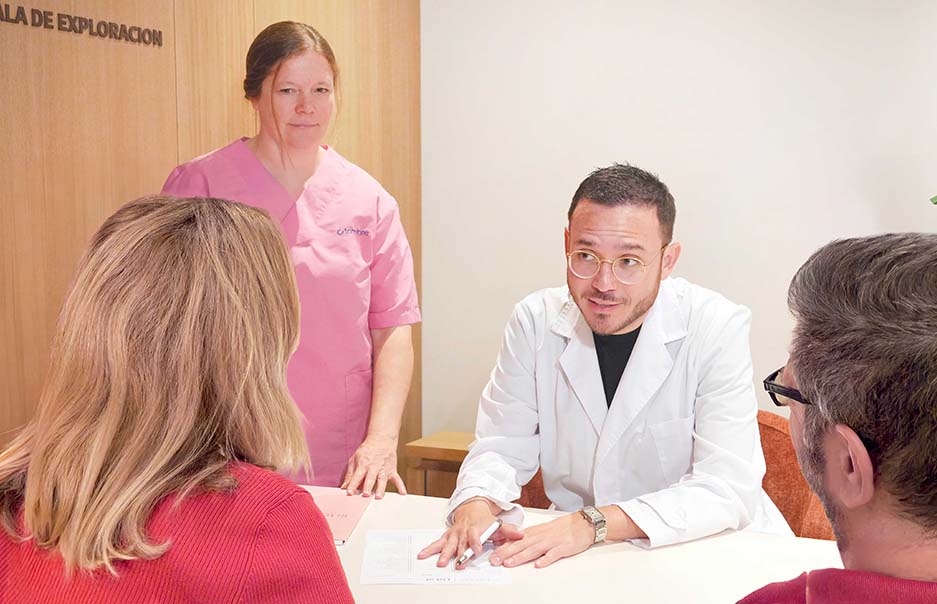blog tambre
How to detect and prevent Fragile X Syndrome through assisted reproduction

Table of contents
Having a healthy child free of genetic diseases is a desire and a concern for all women and couples who wish to have a baby. It is also a concern for the entire team at Tambre, where we work every day to achieve this. Certain techniques such as Preimplantational Genetic Testing (PGD/PGT) and Compatibility Genetic Test (CGT), also known as Genetic Matching, help to detect and prevent the transmission of genetic diseases such as Fragile X Syndrome.
Although it is considered a rare disease, the truth is that Fragile X Syndrome is the first cause of hereditary intellectual disability, and the second genetic cause after Down’s Syndrome. It is essential to know its characteristics and how it is inherited, in order to understand the possibilities of prevention offered by assisted reproduction.
What is Fragile X Syndrome?
Fragile X syndrome, also known as Martin-Bell syndrome or Marker X syndrome, is a neurodevelopmental disorder of genetic and hereditary origin related to the X chromosome.
Specifically, this pathology is caused by a mutation in the FMR1 gene, which is responsible for producing a protein called FMRP. This protein is vital for neuronal tissues and brain connections to function correctly. In people with Fragile X syndrome, the FMR1 gene has an abnormal expansion of trinucleotide repeats, which prevents proper production of the FMRP protein. It is the lack of this protein that results in inadequate brain development. However, even if the production gene is missing, it is always possible to produce some amount of protein. This is why the severity and symptoms of the disease are variable.
Symptoms
The most common signs and symptoms in children and adults with this syndrome are:
- Developmental delays: delays in walking, talking or toileting, as well as delayed language, which is a leading indicator.
- Learning problems: difficulty in acquiring new skills.
- Social and behavioural problems: lack of eye contact, anxiety, attention problems, hand fidgeting, impulsive behaviour and high activity.
- Autism.
- Seizures or epileptic episodes.
- Sleeping difficulties.
- High sensitivity to sensory stimuli.
The Madrid Fragile X Syndrome Association points out that intellectual disability appears in almost all males (98%) with the syndrome and in 50% of females, therefore, some females with the syndrome may have normal intelligence. The reason for this disparity is that males, having only one X chromosome, are more likely to show severe symptoms. In females, the presence of two X chromosomes may partially compensate for the mutation, making symptoms less obvious.
Therefore, each patient has a different degree of intellectual disability, ranging from mild to severe, depending on functional and cognitive development.
Prevalence of Fragile X Syndrome
Se estima que son portadores de este gen uno de cada 750 hombres y una de cada 250 mujeres.
También se estima que esta enfermedad afecta a uno de cada 4.000 hombres y a una de cada 8.000 mujeres.
Debido a su baja prevalencia, el Síndrome X Frágil se clasifica como una enfermedad rara, afectando a aproximadamente a cinco personas por cada 10.000. En nuestro país, la Federación de Síndrome X Frágil de España estima que hay unas 10.000 personas con discapacidad intelectual causada por este síndrome, y aproximadamente 50.000 mujeres son portadoras del gen. Además, se calcula que entre el 80 y 90% de los casos no están diagnosticados.
It is estimated that one in 750 men and one in 250 women carry this gene.
It is also estimated to affect one in 4,000 males and one in 8,000 females.
Due to its low prevalence, Fragile X Syndrome is classified as a rare disease, affecting approximately five people per 10,000. In our country, the Spanish Fragile X Syndrome Federation estimates that there are about 10,000 people with intellectual disabilities caused by this syndrome, and approximately 50,000 women are carriers of the gene. Furthermore, it is estimated that between 80 and 90% of cases are undiagnosed.
How Fragile X Syndrome is inherited
This syndrome occurs in both males and females. Any alteration or mutation in the X chromosome, which is a sex chromosome and defines the baby’s gender, can cause pathologies that are passed on from parents to their children in different ways. In this case, there may be people who are carriers of this genetic mutation, without developing or presenting symptoms of the syndrome.
When a woman is a carrier, the risk of transmitting the syndrome is approximately 50% in each pregnancy. Therefore, a woman who is a carrier of this mutation can have healthy, carrier or affected sons and daughters. Specifically, 50% of sons may be affected, and 50% of daughters may be carriers or have some degree of the disease.
When the male is a carrier, all his daughters will also be carriers as these women receive the fragile X chromosome from their father. On the other hand, their sons will not have the mutated gene, as they receive only the Y chromosome from their father.
The role of assisted reproduction
Fragile X syndrome also affects the reproductive health of both carriers and sufferers. In fact, female carriers have an increased risk of early ovarian failure and early menopause due to low ovarian reserve. Approximately 20% of carrier women have premature ovarian failure compared to 1% of the normal population.
Therefore, by means of a genetic study, we can find out the causes of fertility problems and detect whether Fragile X Syndrome may be the possible cause of premature ovarian failure or early menopause in women with fertility problems.
But in addition to knowing the possible cause of fertility problems, the genetic study allows us to know the risk of having offspring affected by this syndrome. The information obtained from the genetic study allows the woman and the couple to be able to decide freely, being aware of the risk they are taking and of the therapeutic possibilities offered by in vitro fertilisation and the different techniques to avoid transmitting defective genes.
Selection of gamete donors
In cases where one of the parents is a carrier of the mutated gene, or where the woman also has a low ovarian reserve due to being a carrier of the disease, we can resort to oocyte donation or a sperm donor who is not a carrier in order to avoid transmitting the syndrome. In addition, we can combine donation with PGD to maximise the chances of having a child free of Fragile X Syndrome.
Detection and prevention of Fragile X Syndrome in Clinica Tambre
En la Clínica Tambre, ofrecemos servicios de diagnóstico genético avanzado y reproducción asistida para detectar y prevenir la transmisión de enfermedades genéticas como el síndrome X Frágil. Realizamos el Diagnóstico Genético Preimplantacional (DGP) y el Test de Compatibilidad Genética, y otras técnicas de reproducción asistida para asegurarnos la salud y bienestar de tu futuro bebé. Consúltanos si tienes dudas.
At Clinica Tambre, we offer advanced genetic diagnosis and assisted reproduction services to detect and prevent the transmission of genetic diseases such as Fragile X syndrome. We carry out Preimplantation Genetic Diagnosis (PGD) and Genetic Compatibility Testing, as well as other assisted reproduction techniques to ensure the health and well-being of your future baby.
Feel free to contact us if you have any questions.



